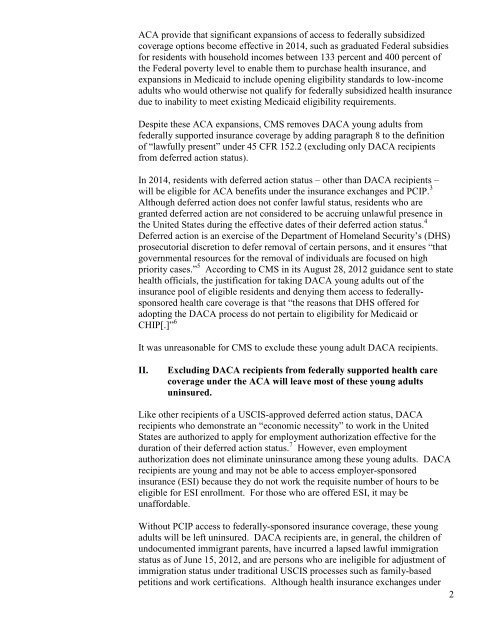HLA submits comments to the Centers for Medicare & Medicaid ...
HLA submits comments to the Centers for Medicare & Medicaid ...
HLA submits comments to the Centers for Medicare & Medicaid ...
Create successful ePaper yourself
Turn your PDF publications into a flip-book with our unique Google optimized e-Paper software.
ACA provide that significant expansions of access <strong>to</strong> federally subsidized<br />
coverage options become effective in 2014, such as graduated Federal subsidies<br />
<strong>for</strong> residents with household incomes between 133 percent and 400 percent of<br />
<strong>the</strong> Federal poverty level <strong>to</strong> enable <strong>the</strong>m <strong>to</strong> purchase health insurance, and<br />
expansions in <strong>Medicaid</strong> <strong>to</strong> include opening eligibility standards <strong>to</strong> low-income<br />
adults who would o<strong>the</strong>rwise not qualify <strong>for</strong> federally subsidized health insurance<br />
due <strong>to</strong> inability <strong>to</strong> meet existing <strong>Medicaid</strong> eligibility requirements.<br />
Despite <strong>the</strong>se ACA expansions, CMS removes DACA young adults from<br />
federally supported insurance coverage by adding paragraph 8 <strong>to</strong> <strong>the</strong> definition<br />
of “lawfully present” under 45 CFR 152.2 (excluding only DACA recipients<br />
from deferred action status).<br />
In 2014, residents with deferred action status – o<strong>the</strong>r than DACA recipients –<br />
will be eligible <strong>for</strong> ACA benefits under <strong>the</strong> insurance exchanges and PCIP. 3<br />
Although deferred action does not confer lawful status, residents who are<br />
granted deferred action are not considered <strong>to</strong> be accruing unlawful presence in<br />
<strong>the</strong> United States during <strong>the</strong> effective dates of <strong>the</strong>ir deferred action status. 4<br />
Deferred action is an exercise of <strong>the</strong> Department of Homeland Security’s (DHS)<br />
prosecu<strong>to</strong>rial discretion <strong>to</strong> defer removal of certain persons, and it ensures “that<br />
governmental resources <strong>for</strong> <strong>the</strong> removal of individuals are focused on high<br />
priority cases.” 5 According <strong>to</strong> CMS in its August 28, 2012 guidance sent <strong>to</strong> state<br />
health officials, <strong>the</strong> justification <strong>for</strong> taking DACA young adults out of <strong>the</strong><br />
insurance pool of eligible residents and denying <strong>the</strong>m access <strong>to</strong> federallysponsored<br />
health care coverage is that “<strong>the</strong> reasons that DHS offered <strong>for</strong><br />
adopting <strong>the</strong> DACA process do not pertain <strong>to</strong> eligibility <strong>for</strong> <strong>Medicaid</strong> or<br />
CHIP[.]” 6<br />
It was unreasonable <strong>for</strong> CMS <strong>to</strong> exclude <strong>the</strong>se young adult DACA recipients.<br />
II.<br />
Excluding DACA recipients from federally supported health care<br />
coverage under <strong>the</strong> ACA will leave most of <strong>the</strong>se young adults<br />
uninsured.<br />
Like o<strong>the</strong>r recipients of a USCIS-approved deferred action status, DACA<br />
recipients who demonstrate an “economic necessity” <strong>to</strong> work in <strong>the</strong> United<br />
States are authorized <strong>to</strong> apply <strong>for</strong> employment authorization effective <strong>for</strong> <strong>the</strong><br />
duration of <strong>the</strong>ir deferred action status. 7 However, even employment<br />
authorization does not eliminate uninsurance among <strong>the</strong>se young adults. DACA<br />
recipients are young and may not be able <strong>to</strong> access employer-sponsored<br />
insurance (ESI) because <strong>the</strong>y do not work <strong>the</strong> requisite number of hours <strong>to</strong> be<br />
eligible <strong>for</strong> ESI enrollment. For those who are offered ESI, it may be<br />
unaf<strong>for</strong>dable.<br />
Without PCIP access <strong>to</strong> federally-sponsored insurance coverage, <strong>the</strong>se young<br />
adults will be left uninsured. DACA recipients are, in general, <strong>the</strong> children of<br />
undocumented immigrant parents, have incurred a lapsed lawful immigration<br />
status as of June 15, 2012, and are persons who are ineligible <strong>for</strong> adjustment of<br />
immigration status under traditional USCIS processes such as family-based<br />
petitions and work certifications. Although health insurance exchanges under<br />
2




